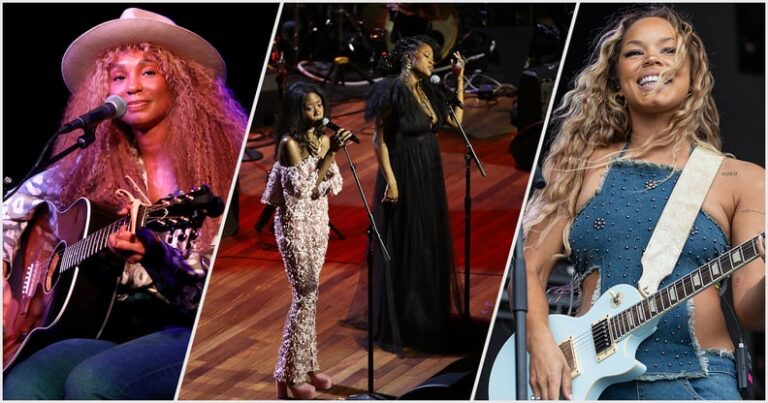
 Getty | Jason Kempin; Leah Puttkammer; Michael HickeyGetty | Jason Kempin; Leah Puttkammer; Michael Hickey
Getty | Jason Kempin; Leah Puttkammer; Michael HickeyGetty | Jason Kempin; Leah Puttkammer; Michael Hickey
Tanner Adell fell in love with country music young.
She grew up splitting her time between Los Angeles and Star Valley, WY, which created a stark contrast — but it was the country lifestyle, and specifically the music, that held her heart. Adell remembers falling in love with Keith Urban when he released “Somebody Like You.” And every summer, when she and her mom would set out to drive back to LA from Star Valley, she’d sit in the back of the car and “just silently cry my eyes out as we’d start on this road trip back to California,” she remembers.
These days, Adell is a rising country music star. And ever since Beyoncé released “Texas Hold ‘Em” and “16 Carriages” on Super Bowl Sunday and announced her forthcoming country album, the spotlight has been on Black women country artists like her. A lot of that attention has been positive; Adell and others say they’re incredibly excited about what this will mean for the genre. But it’s also been a bit contentious. After an Oklahoma radio station refused to play Beyoncé because it “is a country music station,” an online uproar convinced the station to reverse its decision — and ignited a larger conversation around inclusion within the genre.
On March 19, Beyoncé announced “Act II: Cowboy Carter” will be released on March 29. In an Instagram post, she opened up about what it means to be a Black woman in country. “This album has been over five years in the making. It was born out of an experience that I had years ago where I did not feel welcomed…and it was very clear that I wasn’t. But, because of that experience, I did a deeper dive into the history of Country music and studied our rich musical archive. It feels good to see how music can unite so many people around the world, while also amplifying the voices of some of the people who have dedicated so much of their lives educating on our musical history,” she wrote. “The criticisms I faced when I first entered this genre forced me to propel past the limitations that were put on me. act ii is a result of challenging myself, and taking my time to bend and blend genres together to create this body of work.”
“Country music is how you feel, it’s your story, it’s part of you.”
Indeed, for other Black women artists like Adell, pursuing country music often transcends the difficulty that might come with navigating their identity in a genre dominated by white men. As she puts it, “Country music is how you feel, it’s your story, it’s part of you.”
The same was true for Tiera Kennedy when she started writing songs in high school. She was a big fan of Taylor Swift at the time, and she just fell into expressing herself through the genre. “I always say I don’t feel like I found country music, I feel like country music found me,” she tells POPSUGAR. “When I started making music, it just came out that way. I was writing what I was going through at the time, which was boy drama. And I fell in love with all things country music and just dove into it.”

 RelatedRelated
RelatedRelated
The Complicated Reality of Being a Black Taylor Swift Fan
Moving to Nashville seven years ago was “a big deal” for Kennedy in terms of building up her career: “Everyone told me that if you want to be in country music, you have to be in Nashville.” When she got there, she was surprised she was so welcomed by others in the industry, which doesn’t necessarily happen for everyone, given how tight-knit the city can be. “I was super thankful and blessed to have met so many people early on who have opened doors for me without asking for anything in return,” Kennedy says.
For Adell, too, moving to the “capital of country music” almost three years ago was huge in pushing her career forward. And an essential part of that has been finding a community of other Black women artists. “Oh, we have a group chat,” she quips. “We’re extremely supportive, and I think sometimes people are trying to pin us against each other or even pin us against Beyoncé, but you’re not going to get that beef or that drama.”
“Country is just as much a part of the fabric of Black culture as hip-hop is.”
But while these artists have been able to foster a strong community within Nashville, it’s no secret that country music has been facing a reckoning when it comes to racism and sexism. Chart-topping artists like Jason Aldean and Morgan Wallen have recently weaponized racism as a marketing tool, per NPR. In September, Maren Morris said she was distancing herself from the genre for some of these reasons. “After the Trump years, people’s biases were on full display,” she told the Los Angeles Times. “It just revealed who people really were and that they were proud to be misogynistic and racist and homophobic and transphobic.”
But the reality is that Black artists have always been part of the foundation of country. As Prana Supreme Diggs — who performs with her mom, Tekitha, as O.N.E the Duo — says, “Black Americans, so much of our history is rooted in the South. Country is just as much a part of the fabric of Black culture as hip-hop is.”
Diggs grew up in California watching her mother, a vocalist for Wu-Tang Clan, host jam sessions at her house. She’s been wanting to perform professionally with her mom since she was a teenager, but it wasn’t until the beginning of the pandemic that they really committed to their joint country project.
For Diggs, there’s been nothing but excitement since Beyoncé’s commercial came on during the Super Bowl. She immediately ran to her computer to listen to the songs. “And the second the instrumental came on for ‘Texas Hold ‘Em’ came on, I was like, oh my god, it’s happening,” she says. “We are finally here.”
Tekitha felt the same way. “In the Black and country community, we’ve really been needing a champion,” she says. “We’ve been needing someone who can kind of blow the door open and to recognize our voice is important in this genre.”
Adell says that given how iconic Beyoncé is, the criticism she’s received speaks volumes about how far country still has to go. “For her to have given so much of herself to the world and when she decides to have a little stylistic change to not just be supported — I don’t understand it,” she says. “I don’t understand why people aren’t just like, ‘This is cool, Beyoncé’s coming out with a country album!'”
Kennedy tries to focus on the positives of the industry (if she gets shut out of an opportunity, for example, she won’t dwell, she’ll just go after the next), but being a Black woman in America will always come with systemic challenges. “No, it hasn’t always been easy,” she says. “There are so many layers tacked onto that: being a new artist, being female, being Black in country music. But I think if I focused on how hard that is, I would fall out of love with country music.”
That positive thinking has been paying off. After the Super Bowl, Kennedy released a cover of “Texas Hold ‘Em,” and it went viral. After she posted the video, new fans streamed into her DMs, telling her they didn’t even know her type of country, which is infused with R&B, existed. It’s something other Black women country stars are echoing: that the new focus on their contributions to the genre is a long time coming — and a huge opportunity.
“I’m super thankful that Beyoncé is entering into this genre and bringing this whole audience with her,” Kennedy says. “And hopefully that’ll bring up some of the artists that have been in town a long time and grinding at it. I don’t think there’s anybody better than Beyoncé to do it.”

